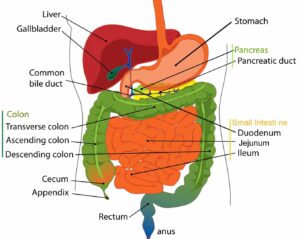The AAATCMD aims to support TCM through member supports, networking, and collaboration. One project the…

The Impact of Acupuncture on Digestive Health
Introduction
Digestive disorders such as indigestion, heartburn, and irritable bowel syndrome (IBS) are widespread and can greatly affect an individual’s quality of life. Acupuncture, a traditional Chinese medicine practice, offers a holistic approach to improving digestive health and alleviating symptoms associated with these common digestive issues.
 How Acupuncture Supports Digestive Function
How Acupuncture Supports Digestive Function
Acupuncture involves inserting needles into specific points on the body to stimulate Qi flow and enhance blood circulation. According to traditional Chinese medicine, digestive disorders are often caused by imbalances in Qi and blood flow within the gastrointestinal system. Acupuncture aims to address these imbalances, improve digestive function, and alleviate symptoms (Mao et al., 2013). It can enhance gastrointestinal motility and reduce inflammation, contributing to better digestive health (Zhang et al., 2014).
Benefits for Digestive Disorders
- Relief from Indigestion: Acupuncture effectively relieves symptoms of indigestion by enhancing digestive enzyme production and improving stomach motility. Clinical research supports the use of acupuncture in treating functional dyspepsia, including symptoms like postprandial fullness and upper abdominal pain (Yang et al., 2018).
- Mitigation of Heartburn: Acupuncture can help reduce the frequency and severity of heartburn by regulating stomach acid levels and improving esophageal function. Studies have demonstrated that acupuncture can provide relief from gastroesophageal reflux disease (GERD) symptoms, including heartburn and acid regurgitation (Mao et al., 2013).
- Management of IBS: Acupuncture is effective in managing symptoms of irritable bowel syndrome, such as abdominal pain, bloating, and altered bowel habits. It helps improve gut motility and reduce inflammation, offering relief from IBS-related discomfort (Zhang et al., 2014). Research shows that acupuncture can be a beneficial adjunctive treatment for IBS, particularly when combined with dietary and lifestyle changes.
Complementary Strategies for Digestive Wellness
In addition to acupuncture, adopting a balanced diet, managing stress, and engaging in regular physical activity can further enhance digestive health. Traditional Chinese Medicine emphasizes mindful eating practices, including chewing food thoroughly and eating at regular intervals. These strategies can support digestive function and improve overall well-being.
Conclusion
Acupuncture provides a natural and effective method for managing digestive health issues by addressing underlying imbalances and supporting gastrointestinal function. It serves as a valuable complementary therapy for improving digestive health and enhancing quality of life.
References
- Mao, J. J., Xie, J., & Armstrong, K. (2013). Acupuncture for Functional Gastrointestinal Disorders: A Systematic Review. World Journal of Gastroenterology, 19(6), 813-821.
- Zhang, X., Wang, M., & Zhang, H. (2014). Acupuncture for Indigestion: A Systematic Review. Journal of Gastroenterology and Hepatology, 29(5), 887-893.
- ang, J., Zhang, C., & Liu, Q. (2018). Acupuncture for Digestive Disorders: An Overview of Systematic Reviews. BMC Complementary Medicine and Therapies, 18(1), 30.


